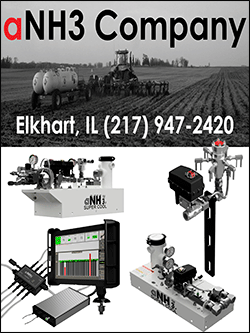|
 Vernon learned about
farming from his dad, and from his Uncle Lloyd who retired from
Caterpillar. They farmed together for many years. Vernon learned about
farming from his dad, and from his Uncle Lloyd who retired from
Caterpillar. They farmed together for many years.
Starting out as a boy and tagging along with his three brothers,
Vernon learned how to farm and raise crops. He baled hay and did
corn shelling as a family side business to make extra cash.
Later, he networked in the neighborhood with other farmers until he
was fortunate that a landlord rented out land to him.
Years progressed, and like dad, Vernon's daughter Sharon tagged
along with him as she learned the skills of farming and harvesting.
Today, Vernon has the pleasure to be farming with his daughter
Sharon (Klockenga) Jones, son-in-law Casey Jones, and granddaughter
Rachael (Jones) Welker; continuing three generations farming
together.
When they are not planting a crop, Mrs. Jones and her daughter Mrs.
Welker are substitute teachers.
Twenty eight-year-old Rachael is a 2012 graduate of Illinois State
University with an elementary teaching degree. She is now starting
her seventh year as a substitute teacher.

Sharon has taught since 1987, and worth noting, “I also graduated
from Illinois State University with an Ag Education degree.”
Sharon and Vernon say farming techniques have changed a lot in the
past years. When they raised hogs for 4-H projects they had about
four to five gilts, (momma pig before its first litter). Then they
bred them and they became sows with up to 14 piglets in the litter.
“New genetics have changed in muscling up pigs causing some breeds
to experience some problems in the birthing process,” Jones said.
“Overtime,” Vernon said, “white breeds such as Chester Whites seem
to be used for the mothering traits.”
“We no longer have a local market to sell hogs because packers want
volume like a semi-load of pigs at a time.” This leaves smaller
groups of pigs that can be sold at smaller places like Goodfield,
indicated Jones.
Hog days gone by, the focus today is on crop production and Vernon
has seen a lot has changed in crop management in the last half
century.
In the field

Mid-October, and the 2018 harvest is coming to an end. Here Vernon
Klockenga combines a small field north of Lincoln.
Corn production certainly has
changed. Recalling from his beginning days, Klockenga said, “One
hundred bushels used to be good 58 years ago and now 200 bushels is
expected.” He adds, “Now we have the option of using fungicides and
pesticides that get the higher yield.”

Klockenga is highly adept and appreciative using the data supplied
by the latest technology found in his tractor cab. The GPS guided
system tracks and records data that suggests where the field may
have low fertility or a wet spot.

Vernon actively divides his attention on all aspects of operating
the combine while keeping an eye on the yield monitor. The data will
be
available later for closer examination and assessment. He has a
favorite practice of alternating every eight rows with two different
types of corn to see which performs better in that field that year.
In the field technology not
only tabulates seed planting rates, but also fertilizer and
chemicals, known as variable rates. The field data saves using the
whole rate of the product where it is not needed.
Field improvements can also be determined, such as if and where
tiles might be laid so wet areas will not deplete nutrients to the
crop.
What the Klockenga finds as one of the best technologies is using
the Yield Monitor that is inside the combine and tractor. It is
connected to a satellite and records and stores information and
relays all kinds of information; it’s not just about seed. They have
found it worth the money to purchase the technology and it has paid
for itself almost since the first year of purchase.
By way of example, the system allows the planter to shut off one row
at a time and saves seed. Klockenga said that it can go 10 miles an
hour and the faster it goes the more accurate it plants the seed
width.
“High speed planting helps where small details are a concern. We
have the technology to cover a lot of ground efficiently and more
effectively,” said Jones.
The Klockenga's attend farmer seminars held in Sherman by Farm
Credit to set up their crop insurance. They also utilize the Top
Flight Elevator based in Monticello on marketing strategies, along
with learning about other products in meetings by Ag Land FS. Jones
recommends the weekly Pro Farmer’s magazine to get insight on the
market for corn and beans.
[to top of second column] |
 A marketing tool that Mr.
Klockenga uses offered through Top Flight is their average pricing
program. We set an amount of bushels for Top Flight to market for us
and they come up with an average price. They recommended no more
than 25 percent of your production. “This program takes some of the
headache of marketing off of yourself,” said Jones.
Jones said she would like
to see less paperwork and involvement from the government since she
handles all of their bookkeeping and paperwork, and some of the
paperwork for the landlord. “Things like President Trump and
tariffs, and no control of prices, would be beneficial. But
sometimes when there is a bad season you need the assistance,” she
added.
Looking to the future
“We are good stewards of the land. With all the new technology we
have so many more useful tools to produce the grain we need to feed
the world. We do everything - from different tillage practices to
selecting our seed - to protect the environment the best we can and
all the while raise a bountiful crop.
“We have a small window to do our 2,600 acres. We know how much we
have to do and take care of in a season,” said Jones.
Klockenga explained how affiliation with Farm Bureau Farm Management
benefits their operations, "This is a service that does our
bookkeeping, tax prep, and comparative analysis. A known program to
benefit every aspect of our farm operation; we use it heavily on
making our financial decisions. This is a state-wide service that
farmers can be affiliated."
What Mr. Klockenga likes most about farming is that his kids are
farming with him.
He says, “I always wanted to be a farmer,” he said. “It is great
that one kernel of corn or beans multiply a hundred times."

Klockenga recommends to young farmers just getting started in making
a career, to make a commitment to being a farmer. He also provided
the following tips:
-
Start with another farmer
who can pass their farm on.
-
Keep money that is earned
to put back into farming.
-
Link up with mentors.
There are fantastic stories of farming out there.
-
Bring your experiences
home.
-
He suggests doing an
interview to work on the family farm to make sure ‘yes’ it is
their desire to become a farmer.

With Vernon running the combine, the truck drivers for the day are
his son-in-law Casey Jones and granddaughter Rachael (Jones) Welker.
They visit with a neighbor as they wait as for the grain tank to
fill. Sharon
noted she wanted to farm because she loves the outdoors and being
able to work with her family everyday. She enjoys watching the
seasons change and all that entails as the crop grows and matures
through the year until harvest time, and knowing she had a part of
the process. She said, “I enjoy the work and getting dirty. I
like looking across a field and the feeling of accomplishment that I
worked all that ground today.”
What could be better in the Spring than to be outdoors working the
land for a new production.
Vernon’s granddaughter Rachael works the ground, son-in-law Casey
sprays the fields, Vernon plants the seeds, daughter Sharon hauls
the seeds, and momma Janet makes the meals. They stop for coffee at
nine a.m. and dinner is in the field at noon. “We stop to stretch,”
said Sharon, and “sometimes at the end of the day we have beer:30 on
the porch and discuss things.”

And once a year while letting plants do their work, leaves absorb
the sun's energy, kernels or seeds swell, and the sweet aroma of
corn dew blankets the Logan County countryside most evenings; Mr.
Klockenga has a fish fry and invites the neighbors and the
landlords. It is a nice interlude to connect on a personal basis
before the hectic come-what-may harvest.
|